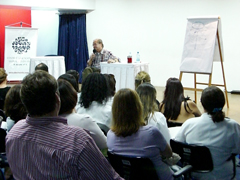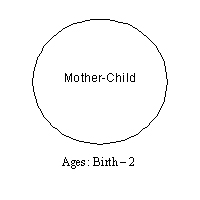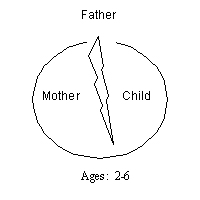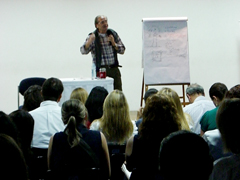A Paradigm Shift in Raising Children in Today’s Generation
29/06/2009 · por Frank Ehrenfried
On Friday June 19th, CELV was honored to have the presence of an expert psychiatrist and child specialist as guest lecturer. Dr. Jose Outeiral was invited by the school’s administration to speak about the difficulties of raising children in the current generation. This event’s aim was to allow parents and teachers to gain a better understanding of the issues many may come across with their own little ones. Dr. Outeiral’s lecture hit upon three main topics including: The current crisis of a shorter and less defined childhood phase, the importance of children’s play as a crucial factor in the development of interpersonal skills, and lastly the development of children’s identities in relation to their parents.

As consumerism in the last 60 years has played an ever-increasing role in our lives, our guest speaker pointed out the dangers of an ever shortening infantile phase of life, as adulthood is slowly creeping into childhood. This point was made evident through the behavior of children in the classroom as many are attempting to imitate adults. This invasion has been heavily influenced by corporations in an attempt to turn children into powerful consumers. Dr. Outeiral’s main point was to warn and defend the years of childhood in order to preserve the phase. This involves shying away from the need to purchase adult type items for children such as make up kits and kid friendly high-heels. While these examples may seem trivial, in reality they are powerful indicators of the strong influence this consumption habit is having upon them.

This crisis of consumption and the invasion of adulthood into childhood directly connects to the second point of Outeirals lecture: the importance of play in the classroom. Dr. Outeiral warned of the focus shift in today’s generation away from one another on to that of material objects. Examples he gave resonate directly to the powerful influence television and computer’s have on children in today’s world, as it is getting more and more difficult to see streets filled with little ones playing. The need to rescue this medium of play is of the upmost importance, as more and more children are losing the ability to successfully build healthy relationships. This loss comes at the cost of a lag in interpersonal skill development, as the connections children make through play greatly help them later in life.
Lastly, Dr. Outeiral discussed the manner in which children develop their social identities in relation to both mother and father. At birth the first being that an infant makes a solid connection to is its mother through natural maternal interactions. This connection must start to become severed early on in order to introduce different relationships to the child. This severing of the mother-child connection is crucial in the development of infant’s autonomy. This autonomy relies on the mother’s acceptance of the severed connection as new social bonds are created with other people. The diagram below demonstrates this connection, showing the mother-child relationship and then the introduction of the father in the picture.


The gradual introduction of other relationship in the infant’s life is important in the natural development of the child. This comes in contrast to a child heavily dependent on its mother at ages 3-6 which may become a grave hindrance to its social development later in life.
After a powerful hour of discussing these topics in depth, Dr. Outeiral answered a myriad of questions brought to the stage in order to connect the comprehensive themes he had discussed in the lecture to more specific situations. Parents were able to gain a unique perspective into the theories behind raising children in today’s world, while also having the advantage of a medical doctor’s forty years of clinical experience to back up these very theories.

We invite you to participate in other up coming lectures, as experts in the field of child development have a wealth of experience and knowledge to share with you in your journey as parents.

Página Inicial |
Tour Virtual | Notícias | Inscrições em Atividades | Fale Conosco | Circulares | Infantil | Fundamental | Ensino Médio | A Escola | Perspectiva Cultural | Fóruns Acadêmicos | Viagens Acadêmicas | Oficinas Opcionais | Vestibulares e Enem | Olimpíadas | High School | Conteúdo Pedagógico | Informações 2013 | Inscrições em Atividades
Rua Elias Tommasi Sobrinho, 154, Santa Lúcia - Vitória, ES - Brasil - CEP 29056-910 - Tel: (27) 3334 6300
© Centro Educacional Leonardo da Vinci 2025 · www.davincivix.com.br
Rua Elias Tommasi Sobrinho, 154, Santa Lúcia - Vitória, ES - Brasil - CEP 29056-910 - Tel: (27) 3334 6300
© Centro Educacional Leonardo da Vinci 2025 · www.davincivix.com.br
